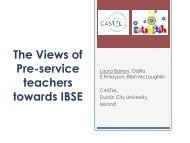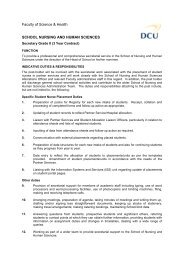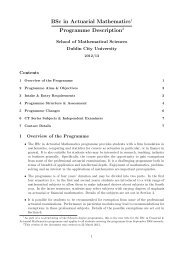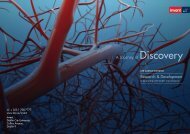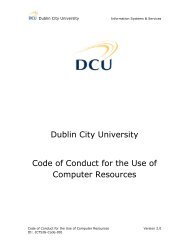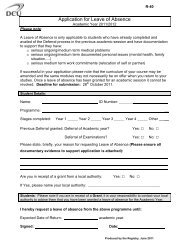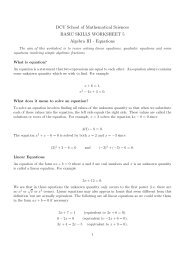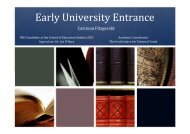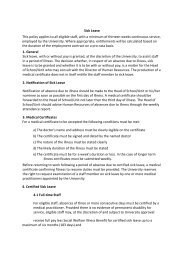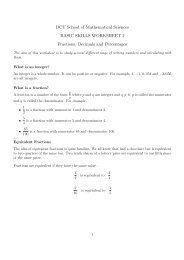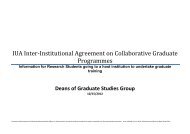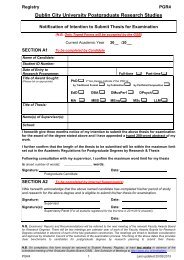Dublin City University Postgraduate Programmes 2012 - DCU
Dublin City University Postgraduate Programmes 2012 - DCU
Dublin City University Postgraduate Programmes 2012 - DCU
Create successful ePaper yourself
Turn your PDF publications into a flip-book with our unique Google optimized e-Paper software.
38 <strong>Dublin</strong> <strong>City</strong> <strong>University</strong> <strong>Postgraduate</strong> Prospectus <strong>2012</strong><br />
Faculty of Engineering and Computing<br />
The School of Mechanical and<br />
Manufacturing Engineering<br />
Contact Information<br />
For more detailed information on programme content please visit:<br />
http://www.dcu.ie/mechanical_engineering/index.shtml<br />
Contact Details<br />
Taught <strong>Programmes</strong><br />
Dr. Paul Young<br />
Tel +353 1 700 8216<br />
Email: paul.young@dcu.ie<br />
Research<br />
Dr. Garrett McGuinness<br />
Tel: +353 1 700 5423<br />
Email: garrett.mcguinness@dcu.ie<br />
The School was established in 1987, and has offered the<br />
postgraduate degrees of M.Eng. and Ph.D by research since then.<br />
In addition, the school currently offers a suite of taught Level 8<br />
and Level 9 degree programmes. The school has excellent facilities<br />
for engineering education, simulation and design, including: an<br />
extensive suite of CAD/CAM/CAE software and design studios,<br />
stress analysis and fatigue testing laboratories, materials testing and<br />
characterisation laboratories, bioengineering research laboratories,<br />
thermo-fluid computational research, and thermal spraying facilities<br />
and a fully equipped modern engineering workshop.<br />
Important information in relation to <strong>Postgraduate</strong> Studies in the<br />
School of Mechanical and Manufacturing Engineering<br />
The taught postgraduate programme in Computer Aided<br />
Mechanical and Manufacturing Engineering is designed to provide<br />
advanced education to M.Sc. level for graduates with Honours<br />
Mechanical/Manufacturing Engineering degrees. Alternative<br />
entry via Access and Masters Qualifier routes, allows those from<br />
other disciplines and Level 7 (Mech/Man) and three years work<br />
experience to undertake the programme. Students may exit from<br />
the programme with a Graduate Certificate, a Graduate Diploma<br />
or a M.Sc. dependent upon achievement.<br />
The Access and Masters Qualifier run in part-time mode only,<br />
with the M.Sc. being run in full- and part-time mode, and remote<br />
learning for part-time students is supported via lecture notes and<br />
other information online.<br />
• Part time students can study remotely with attendance at<br />
lectures an option.<br />
• The fees are heavily subsided by the NDP (National<br />
Development Plan).<br />
• There are two intakes for most postgraduate courses –<br />
September and February.<br />
• There are flexible entry routes on to the programmes for those<br />
not qualifying directly.<br />
• Three exit routes allow flexibility to choose the workload best<br />
suited to your needs.<br />
[See pages 27 - 29 for summary of taught programmes]<br />
Research<br />
The school hosts active research groups in strategic priority<br />
areas, offering a stimulating research environment with a strong<br />
international dimension. Funding is secured via competitive<br />
national (IRCSET, SFI, Enterprise Ireland, Teagasc) and international<br />
(EU) programmes, as well as direct industry sponsorship.<br />
Selected current topics include:<br />
• Vascular and orthopaedic biomechanics; Ultrasonic medical<br />
devices; Biomaterials and scaffolds for tissue engineering<br />
(ceramics, polymers, natural biomaterials).<br />
• Sustainability, optimisation, energy efficiency in complex<br />
manufacturing systems based on modelling and analysis.<br />
• Materials processing and performance, surface engineering,<br />
process development and automation.<br />
• Smart Materials and Fluids, including automotive applications.<br />
• Computational modelling, including multi-phase flow with<br />
emphasis on energy systems, including solar-thermal and<br />
wave energy.<br />
Prospective students should consult the detailed research profiles<br />
of faculty members available on the School web page at the link<br />
below:<br />
http://www.dcu.ie/mechanical_engineering/staff_details/<br />
academic.shtml<br />
The School of Electronic<br />
Engineering<br />
Contact Information<br />
For more detailed information on programme content please visit:<br />
http://www.dcu.ie/electronics/post/index.shtml<br />
Contact Details<br />
School of Electronic Engineering<br />
Dr. Pascal Landais<br />
Tel: +353 (0) 1 700 8044<br />
Email: landaisp@eeng.dcu.ie<br />
The <strong>DCU</strong> School of Electronic Engineering was established in 1980<br />
and continues to provide top level education to undergraduate and<br />
postgraduate students. The School is a young, dynamic, innovative<br />
and successful school of electronic engineering, focusing on<br />
nurturing the innovation leaders of tomorrow and developing the<br />
research concepts to drive Ireland’s knowledge economy. With a<br />
cohesive set of conscientious hardworking individuals and a strong<br />
esprit-de-corps, the School has been quietly innovating in third and<br />
fourth level education over the last three decades. The School has<br />
evolved in line with the needs of both industry and research, and<br />
offers innovative and valuable higher education options.<br />
The School currently comprises in excess of 100 researchers, 20 of<br />
which are academic staff, 20 are postdoctoral researchers and 65-<br />
70 are PhD students.



